I was born on St Swithin's Day, 15th July 1921 on an extremely hot day, or so I was told. It was less than three years after the First World War. George V was king. 1921 was not a very historic year, except for the establishment of the Irish Free State and a war between Greece and Turkey nothing much happened apart from my arrival!
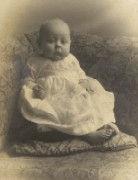 |
| Me as a baby |
My father joined the 2/16 London Regiment The Queen's Westminster Rifles in 1914. After training, his regiment was sent to Ireland in April 1916 to put down the Easter Rising. He then fought on the Western Front until September 1916. They were sent to Greece for a beach landing at Salonica, which was unopposed, and they marched to the northern border to engage the 'Bulgars'. In open warfare they took many casualties and were then withdrawn and sent to Palestine to fight the Turks. Lewis Jones was shot in the head by a sniper and posted missing believed killed. He was actually cared for by Palestinians and rejoined his regiment, only to be returned to the Western Front. Now a sergeant he won the Military Medal at Messines on 28th September 1918. He was demobilised on 18th March 1919. Dad was in good health after the war, except that he had malaria which occasionally gave him a fever.
I do not know how my parents met, but it was probably during the war. Mum worked in a munitions factory. She was packing parachute flares when one ignited. She was not hurt but suffered severe shock and was excused further war work.
At my birth, Dad was back working at Silver Studios at 3 Haarlem Road, Hammersmith in West London, where he did designs for woven and printed furnishings and dress fabrics, and for wallpapers, borders and friezes. To see where he worked you must look for the corner house on the south side of Haarlem Road at the junction with Augustine Road because the address has been changed.
Dad was registered with the name Lewis, but signed some of his artwork Louis. He is Louis on his marriage certificate. He was, however, always known as Jack. My mother's name was Annie but she was always known as Nance. Mum and Dad married in August 1919 when he was 25 and she was 23.
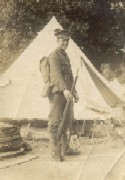 |
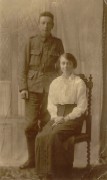 |
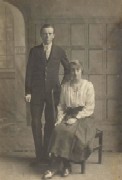 |
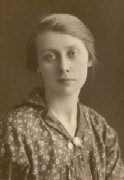 |
| Dad at Saffron Walden (c1916) |
Dad and Mum (c1916) |
Dad and Mum (c1923) |
Mum (c1925) |
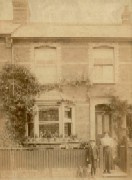 |
| Dad & Ethel (Aunt Doll) outside 22 Lowestoft Road, Watford |
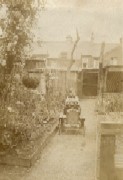 |
| In my pedal car |
The houses in Lowestoft Road, Watford, were first occupied in 1892. Number 22 was slightly larger than the others in the terrace because the upstairs area went over the alley on one side of the house.
Lighting was by coal gas, and quite a good light came from the mantles in glass globes. The light was controlled by chains from the ceiling fitting. In the scullery the only light was from a naked flame from a 'fish tail' burner. Cooking was done on a coal fired range in the living room and this stove was the main source of heating too, and it seemed to me that it was constantly being cleaned to keep the bright parts burnished and the rest rubbed with Zebo blacking. The front room was always kept clean but only used for when we had visitors. There was no bathroom and the only lavatory was a closet with an entrance from the yard.
In my first years I did not go short of anything. Money seemed plentiful and I was probably spoilt. I seem to have got everything I wanted except when I cried for the moon, if the story is true that I said 'I want that' when I saw it. I had many toys but the one I remember best was a tin clockwork airship which went around its mooring mast. Like so many toys at that time it was made in Germany as part of war reparations. I also had a pedal car, it was dark blue in colour, with wooden coachwork. It was made by Lines Brothers and was probably quite expensive.
At that time there were still street traders. Milk was delivered from a churn on a handcart, and the milkman filled his customer's jug using a dipper to measure the amount. A cart of red painted wicker was used by the postman. There was still a muffin-man with a handbell, and a man who we called "Old Cods Head" who may have been a fishmonger, but it is more likely that the "cod's heads" he shouted about were cat food.
I was always full of curiosity, and that was almost my downfall, because one day, when I was about four, I stood upon a chair to see into the frying pan. Fat spat into both my eyes and, although there was no serious damage, I refused to open them until I was persuaded to by a neighbour's daughter, Doris Parsley, who pounded the piano keyboard and I just had to see how that was done!
Some evenings, Mum would take me to Watford Junction railway station to meet dad returning from work. I would stand with my hands gripped to the sooty railings, alongside the Bridle Path, and through them I would watch the trains. After dark the express locomotives would roar by, trailing a shower of burning cinders and with the glare of the firebox lighting up the smoke and steam.
Unemployed ex-servicemen, many of them crippled in the recent war, 'sold' matches in the streets. On one occasion I was given money to hand to one such man and I took a box of matches from his tray. I didn't know that the matches were just for show and I was very embarrassed when people laughed at me. Many years later, the story of those days was told on the radio, and the broadcaster said that as everyone gave many times the value of the matches to take a box was to give the 'seller' some dignity.
 Home
Home